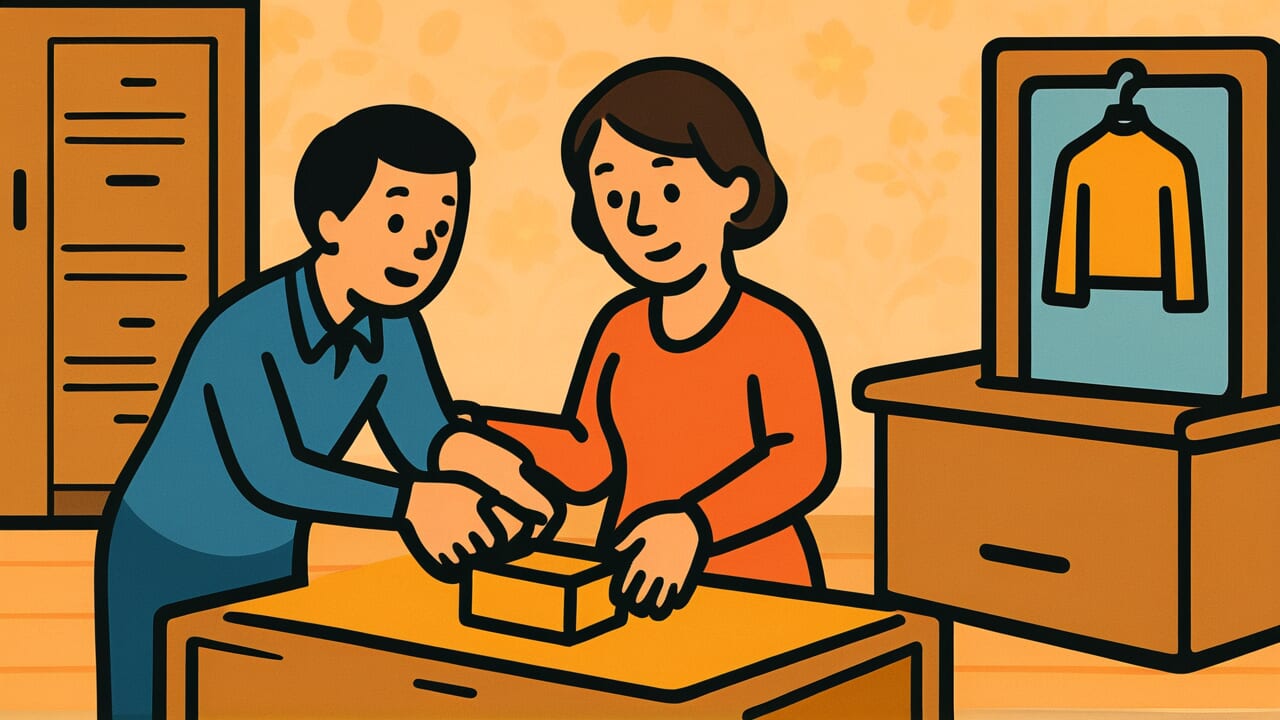How to Read “Entertaining a co-son-in-law with the father-in-law’s things”
Shūto no mono de aimuko motenasu
Meaning of “Entertaining a co-son-in-law with the father-in-law’s things”
This proverb means using someone else’s belongings to make yourself look good. It criticizes people who act as if they prepared something themselves when they actually used things that don’t belong to them.
People use this saying when someone takes credit for another person’s achievements or tries to look generous with borrowed items.
For example, a boss might present an employee’s idea as their own. Or someone might brag about a friend’s possessions as if they owned them.
The proverb emphasizes not just the act of using someone else’s things, but the shamelessness and dishonesty behind it.
By mentioning the specific relationship between father-in-law and son-in-law, it vividly shows someone acting freely when they should be respectful.
Even today, people understand it as a warning against prioritizing appearances over substance.
Origin and Etymology
No clear historical records document the origin of this proverb. However, the words themselves reveal an interesting background.
“Shūto” means father-in-law, specifically the wife’s father. “Aimuko” refers to co-sons-in-law, men married to sisters who share the same father-in-law.
When sisters marry different men, their husbands become “aimuko” to each other.
This proverb likely emerged from Japan’s traditional family system. Sons-in-law once had deep connections with their wives’ families and frequently visited the father-in-law’s home.
The proverb imagines a situation where one son-in-law entertains another at the father-in-law’s house. He freely uses sake and food from the father-in-law’s storehouse to make himself look hospitable.
He acts as if he prepared everything himself when he actually used someone else’s belongings.
The proverb’s cleverness lies in expressing this through familiar family relationships. The delicate position between father-in-law and son-in-law makes the act of showing off with borrowed things even clearer.
Usage Examples
- He’s like entertaining a co-son-in-law with the father-in-law’s things, using company resources to boost his own reputation
- Having your subordinate prepare gifts for clients and then taking credit for the thoughtfulness is entertaining a co-son-in-law with the father-in-law’s things
Universal Wisdom
“Entertaining a co-son-in-law with the father-in-law’s things” sharply captures a timeless human trait: our attachment to appearances and status.
Why do people use others’ belongings to maintain appearances? Because they try to show their worth through external decorations.
They hope that looking good on the surface will earn them recognition, even without real substance. This psychological pattern existed in ancient times just as it does today.
What makes this proverb interesting is that it doesn’t just criticize. It highlights the absurdity of such behavior.
The image of using a father-in-law’s things to entertain a co-son-in-law has a comedic quality. Someone acting boldly when they should be respectful creates a contradiction.
This contradiction clearly reveals the emptiness of showing off.
Our ancestors understood this truth. People sometimes act foolishly because they want recognition, evaluation, and respect.
And such actions ultimately undermine their own foundation. Real value cannot be created with borrowed things.
The proverb’s deep wisdom lies in expressing this universal truth through the familiar setting of family relationships.
When AI Hears This
This proverb presents one of game theory’s most difficult structures: a three-party asymmetric information game.
The key point is that the resource owner, the father-in-law, likely doesn’t know his resources are being used. The co-son-in-law mistakenly believes his father-in-law is hosting him, creating information asymmetry.
Game theory calls this situation a “principal-agent problem.” The father-in-law is the principal, the son-in-law is the agent, and the co-son-in-law is the customer.
Interestingly, the son-in-law’s gain isn’t money but an intangible asset: the co-son-in-law’s good opinion.
According to economist George Akerlof’s research, pursuing short-term gains in such reputation games destroys long-term trust.
Another notable aspect is this game’s “unsustainability.” The probability that the father-in-law discovers the truth increases over time.
The co-son-in-law will also notice contradictions through repeated interactions. This game has a time limit: “when will I get caught?”
In modern terms, this has exactly the same structure as using company expenses for personal entertainment.
The proverb demonstrates a mathematical fact: when three parties are involved, monitoring costs rise sharply and misconduct becomes easier.
Between two people, betrayal is quickly discovered. But with three people, who monitors whom becomes unclear.
Lessons for Today
This proverb teaches modern people that real value must come from within yourself.
We face daily temptations to make ourselves look better, whether on social media or at work.
Borrowing others’ ideas or exaggerating our abilities may actually be easier in the digital age. But this proverb quietly asks: is that really your value?
The important thing is not to rush. Even if you don’t look impressive right now, keep steadily building your real abilities.
It may take time, but what you build with your own hands has a solid weight that borrowed things lack.
The proverb also teaches the value of humility. The courage to admit when you can’t do something.
The honesty to express gratitude when someone helps you. Such attitudes ultimately earn the most trust in the long run.
When you feel tempted to show off, remember this proverb. Your true value lies not in borrowed things, but within yourself.



Comments